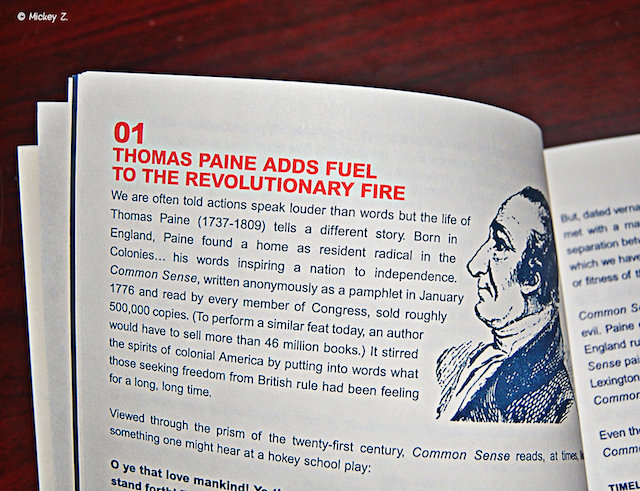Paine Relief: Words Inspire Actions
By Mickey Z.
16 December, 2013
World News Trust

Photo credit: Mickey Z.
“We have it in our power to begin the world over again.” - Thomas Paine
The coast-to-coast mall known as America just loves to sing the praises of its revolutionary heroes -- the land-owning white slaveholders affectionately called “Founding Fathers.” But the United States of Denial would, of course, much rather we ignore the revolutionary roots and spirit behind its birth.
In other words, if pamphleteer Thomas Paine were around today, well, he might not be around today. Can you say “enemy combatant”?
We are often told actions speak louder than words but the life of Tom Paine tells a different, parallel story. Born in England, Paine eventually found a home as resident radical in the Colonies. His mutinous pamphlet, Common Sense, was written anonymously, published in January 1776, and promptly read by every single member of Congress.
Time out: Every member of Congress read Common Sense? (Insert your own punch line here.)
Paine’s Common Sense went on to sell roughly 500,000 copies and helped inspire a fledgling nation to fight for its independence.
Hold on another minute: A seditious pamphlet sold a half-million copies in 1776? To perform a similar feat today, an author would have to sell more than 40 million books. I doubt even Oprah could help make that happen.
Common Sense stirred the spirits of colonial America by putting into words what those seeking freedom from British rule had been feeling for long, long time. Viewed through the prism of the 21st century, Paine’s prose reads, at times, like something one might hear at a hokey school play, for example:
“O ye that love mankind! Ye that dare oppose, not only the tyranny, but the tyrant, stand forth! Every spot of the old world is overrun with oppression. Freedom hath been hunted round the globe. Asia, and Africa, have long expelled her. Europe regards her like a stranger, and England hath given her warning to depart. O! receive the fugitive, and prepare in time an asylum for mind.”
But, dated vernacular aside, Common Sense does make clear what Paine is trying to provoke, e.g. “I have never met with a man, either in England or America, who hath not confessed his opinion, that a separation between the countries, would take place one time or other. And there is no instance in which we have shown less judgment, than in endeavoring to describe, what we call, the ripeness or fitness of the Continent for independence.”
Common Sense popularized the concept that even a good government is, at best, a necessary evil. Paine effectively demonized King George III and argued against a small island nation like England ruling a continent on the other side of the ocean. Perhaps most importantly, Common Sense painted a post-independence picture of peace and prosperity.
More so than the battles at Lexington and Concord -- which preceded the release of Paine’s influential pamphlet -- it was Common Sense that served as the spark to light the revolutionary flame (which is today more honored in the breach).
“These are the times that try men's souls,” Paine once wrote. “Tyranny, like hell, is not easily conquered; yet we have this consolation with us, that the harder the conflict, the more glorious the triumph.”
#shifthappens
Note: To continue conversations like this, come see Mickey Z. in person on Jan. 11 at Bluestockings Bookstore in NYC.
Mickey Z. is the author of 11 books, most recently the novel Darker Shade of Green. Until the laws are changed or the power runs out, he can be found on a couple of obscure websites called Facebook and Twitter. Anyone wishing to support his activist efforts can do so by making a donation here.
© WorldNewsTrust.com
Comments are moderated
